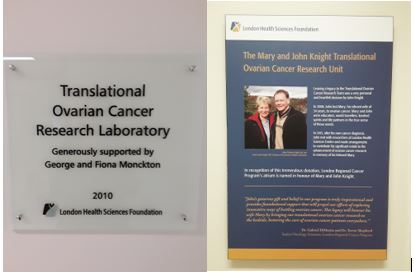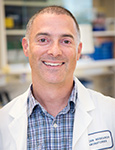Translational Ovarian Cancer Research Group
Translational Ovarian Cancer Research Program, started in 2007, is led by two investigators, Drs. Trevor Shepherd (Senior Translational Oncology Scientist) and Gabriel DiMattia (Interim Director, CRLP; and Senior Oncology Scientist). Together with their clinical colleagues at LRCP and a growing laboratory team, their research focuses on making discoveries that will impact the health of women with ovarian cancer.

Current Research Initiatives and Projects
- Ovarian cancer patients often accumulate fluid in the belly and that fluid can lead to the spread of the disease because it contains cancer cells. These cells group together form clusters and it is thought that these 3D structures are responsible for the spread of ovarian cancer. Dr. Shepherd pioneered the culturing of human ovarian cancer cells as 3D structures or spheroids to generate an experimental model system that more closely approximates cancer cells as they exist in a tumour. In fact, they discovered that ovarian cancer cells in 3D clusters become “dormant”, or temporarily inactive, which would make them resistant to chemotherapy. Therefore, the research team is investigating the molecules that control dormancy to see whether there are ways to kill or stop the spreading of tumour cells.
- All ongoing research projects in the Unit take advantage of the spheroid system to tackle questions around how human ovarian cancer cells can survice as clusters in the abdomen after they are released from the primary tumour site.
- Dr. Shepherd has multiple projects which focus on the altered metabolism of cancer cells and specifically on the effects of an enzyme, LKB1 which is considered one of the master controls of cell metabolism. His group has generated unique human ovarian cancer cell model systems in which the gene for LKB1 has been eliminated. He has determined that LKB1 is a viable drug target and that inhibiting this enzyme significantly impedes the ability of human ovarian cancer cells to remain viable under stressful conditions like chemotherapy treatment.
- Dr. Shepherd is an internationally recognized expert in the process of autophagy which is an important mechanism by which cancer cells can avoid cell death when they metastasize. He has combined his work on LKB1 and autophagy to expand an exciting research program focused on many different aspects of LKB1 biology. For example, his group is working on identifying proteins that interact LKB1 and thus could be developed as drug targets. He has several Western gradute students investigating how LKB1 controls the production of energy in human ovarian cancer cells. In addition, this work has led his group to assess the contribution of AMP-activated protein kinases in ovarian cancer pathobiology including the role of these proteins in controlling how cancer cells stick to new surfaces to establish secondary tumours. Dr. Shepherd has been recognized for his pioneering work in this area by the Ontario Institute for Cancer Research (OICR) and has become a leader in their ovarian cancer translational research group. Dr. Shepherd's team is also generating novel model systems to determine the importance of LKB1 to the intiation of ovarian cancer. His group has developed unique cells where LKB1 has been eliminated in conjunction with other genes known to the mutated in human ovarian cancer to determine how LKB1 contributes to the early stages of human ovarian cancer. Dr. Shepherd has built a highly interactive research group with overlapping research objectives which synergize to create an exciting environment for cancer research, and drug discovery.
- Dr. DiMattia's research has been primarily focussed on the development of unique human ovarian cancer model systems that represent some of the rarer forms of ovarian cancer. This has led to several important research collaborations in the area of low grade serous ovarian cancer and clear cancer of the ovary. This work has developed into studies which examine the epigenetic changes involved in controlling the expression of genes in human ovarian cells when they are maintained as spheroids. These other forms of human ovarian cancer are unique because they often harbor mutations in a specific set of genes which are believed to drive the cancer process. His research is focused on understanding how low grade serous ovarian cancer can be modelled experimentally to investigate how this disease can be treated. Dr. DiMattia's research on clear cell cancer of the ovary is now focused on identifying major biochemical changes on the proteins which form the scaffold for the DNA in cells. The goal is to identify those major biochemical changes associated with ovarian cancer metastasis and identify existing drugs which could be used to destroy those cells as they attempt to metastasize.
- Drs. Shepherd and DiMattia work collaboratively to enhance all ongoing research within the Mary & John Knight Translational Ovarian Cancer Research Unit located on the 4th floor of the London Regional Cancer Program situated within the London Health Sciences Centre, Victoria Campus. Their goal is to build a vibrant research environment where young cancer researchers will strive to bring new and important discoveries to the fight against ovarian cancer.



Dr. Trevor Shepherd Dr. Gabriel DiMattia
You Can Make a Difference
For more information on how you can make a gift that will have the power to change and save lives, please contact:
Pamela Taylor
Development Officer, Cancer
t: 519.685.8721
Email: pamela.taylor@lhsc.on.ca
London Health Sciences Foundation is thankful for our donors. We are pleased to express our gratitude and recognize your generosity and contribution to our Hospital in a number of different, tangible ways








